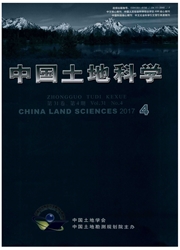

 中文摘要:
中文摘要:
研究目的:基于理论收益与实际收益比较收益的视角,分析农民退地收益是否存在损失,探讨重庆宅基地退出中农民土地收益保护问题。研究方法:基于重庆市现行的宅基地退出补偿政策,构建退地收益理论模型与实际收益模型,结合实证分别测算农民退地的理论收益与实际收益,计算比较收益,分析农民退地收益是否存在损失。研究结果:(1)理论分析与实证验证均表明,重庆市农民退地比较收益(R_(农民理论)-R_(农民实际))大于零;说明现行政策下,重庆宅基地退出中农民面临土地收益损失。(2)重庆市农民退地理论总收益为21.44万元/亩,实际总收益为14.81万元/亩,农民退地比较收益(收益损失)为6.63万元/亩;退地补偿偏低是造成农民退地收益受损的主要因素,而复垦成本偏高则是造成农民退地收益损失的次要因素。(3)不同区位区县农民退地比较收益(收益损失)存在差异,区位条件与农民退地比较收益(收益损失)呈现反相关,区位条件好的地区农民退地比较收益(收益损失)更大。研究结论:应从提高宅基地补偿标准、强化宅基地复垦成本控制,实施区域差异化退地补偿与复垦成本拨付措施等方面完善现行的宅基地退出复垦补偿政策,保护退地农民合法土地收益。
 英文摘要:
英文摘要:
The purpose is to analyze the extent of farmer' land revenue loss during the rural homestead exit to protect the farmers' interests from the perspective comparative revenue. The method is to build a theoretical revenue model and an actual revenue model to measure the theoretical and actual revenue farmers attained from homestead exit. The results show that: 1)the comparative revenue of homestead is greater than zero, showing that the farmers in Chongqing are suffering the loss. 2)the theoretical total revenue farmer gained from homestead exit in Chongqing is 214400 yuan/mu, while the actual total revenue is 148100 yuan/mu, so the comparative profit reach 66300 yuan/mu; the main factor that caused the loss is the low compensation and the secondary factor is higher cost of reclamation. 3)the farmer in different location are suffering from different loss, there is a negative relationship between location and the loss of homestead exit. The conclusion is that: local government should raise land compensation standard, should strengthen land reclamation cost control, and should implement the regional differentiated compensation and reclamation costs repayment, in order to protect farmers' interests.
 同期刊论文项目
同期刊论文项目
 同项目期刊论文
同项目期刊论文
 期刊信息
期刊信息
